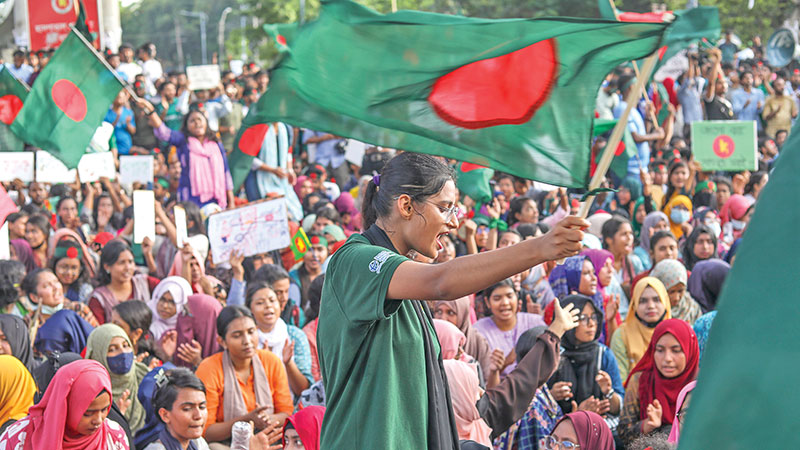 Photo: Bonik Barta
Photo: Bonik Barta The
demand for quota reform movement, which began in June, gained momentum in July,
with Shahbagh serving as its epicenter. Notably, a significant number of female
students were at the forefront of the processions and meetings in Shahbagh,
often leading the protest meetings with their slogans.
This
time, female activists also took a strong stance against women's quotas. They
were seen holding placards with messages such as 'Where women progress, quotas
are ridiculous.' This sentiment was not confined to Shahbagh but resonated in
almost every university across the country.
According
to Dr Sayeed Ferdous, a professor in the Anthropology Department at
Jahangirnagar University (JU), this movement has once again demonstrated the
crucial role women can play in decision-making on state policies.
He
told Bonik Barta, "For the past few years, we have seen that female
students are performing better academically. This progress has likely given
them the confidence that they can advance without quotas. Women have always had
their own perspectives and opinions on important societal and state issues.
However, this movement has strongly demonstrated their courage and advancement.
The police, society or the state can no longer afford to underestimate
women."
According
to the 49th Annual Report of the University Grants Commission (UGC) published
this year, the rate of female students in higher education is 46.55 percent.
Currently, the total number of university students is 4.76 million, comprising
2.54 million male students and 2.21 million female students. Among them, 2.11
million are enrolled in public universities, and 158,583 are in private
universities. A significant portion of these female students played an active
role in this year's movement.
In
mid-July, the quota movement intensified nationwide. On July 15, there was an
attack on students protesting at Dhaka University (DU). On that day, female
students were on the front lines, and the initial attacks were directed at
them. Shima Akter, a student from the Department of Music at DU, recounted the
events to Bonik Barta. She said, "We were at the front lines that day, and
our main concern was to ensure nothing happened to our brothers. We believed
that by being at the front, no one would dare to attack them. However, on that
day, we were brutally attacked. We were beaten severely. I was hit on the head
with a brick. Although I barely survived, I sustained serious facial injuries.
There were nearly a hundred students around me in the VC area that day, most of
whom were women."
She
further said, "Women are becoming more educated now. They are increasingly
aware and self-respecting. Especially for our generation, we have long been
conscious of our rights and responsibilities. We were involved in street
protests during our school and college days. This movement has made us aware of
our rights and responsibilities as citizens. We strive to advance as conscious
citizens beyond any divisions. This is why we were at the forefront of the
quota reform movement, fighting against discrimination to ensure our
rights."
Education
experts believe that the participation of women in the quota reform movement
played a crucial role in advancing the cause. Dr Shamima Sultana, a professor
in the Department of Bangla at Jahangirnagar University (JU), told Bonik Barta,
"Women have shown courageous roles in various movements before. This movement
has once again demonstrated that they are no longer marginalized. They are
confident in their abilities and seek to advance through equal competition, not
through sympathy. The involvement of female students, and even mothers, in this
movement, has inspired everyone with the courage to protest against
discrimination."
She
further added, "When women stand at the forefront of a movement, they not
only fight for their rights but also protect their brothers as sisters.
However, the brutality shown towards women in this movement, the indiscriminate
killing of students, children, and ordinary people, is unprecedented in the
country's history. Furthermore, the arbitrary arrest of students is also
without precedent globally. We demand the release of all detained students,
including Arif Sohel (a student of JU and one of the coordinators of the
central committee of the quota reform movement), and justice for all the
killings. This movement is no longer just about quota reform; what we need now
is state reform."
Several
protest activities in the quota reform movement were initially led by female
students. On the night of July 16, students from Ruqayyah Hall of DU were the
first to break out of their hall, armed with steel plates, spoons, and ladles.
They used these items to make noise, accompanied by slogans. The area became
filled with their chants. After news of the Ruqayyah Hall students' protest
spread, students from other halls began to emerge. That night, female students
from other halls also gathered in front of the Anti-Terrorism Raju Memorial
Sculpture, raising their voices in protest. This movement then spread to other
campuses across the country. At that time, on most campuses, female students
participated in the protests by breaking out of their halls and joining the
demonstrations, showing a remarkable unity among them.
A
student from Ruqayyah Hall recounted the events of that day to Bonik Barta.
Requesting anonymity, she told Bonik Barta, "Those of us who have reached
university have overcome many obstacles. We knew that if someone took the first
step with courage, others would follow. From that perspective, a few of us
decided that we would be the first to start the protest. Then we spoke with a
few others, and they agreed."
In
this regard, Professor Dr Tanzimuddin Khan from the Department of International
Relations at Dhaka University told Bonik Barta, "Student organizations
have less control over female hostels compared to male hostels. In this
context, the administration of female hostels can play a much greater role in
administrative activities, which is largely absent in male hostels except for a
few exceptions. As a result, it is easier for women to mobilize politically,
which is not the case for men. Additionally, if we look at the male-to-female
ratio at the university, it is evident that the number of female students has
increased. In some cases, women even outperform men. It is noteworthy that as
women go through political mobilization, this might become the mainstream in
the future. The nature of women's participation will likely differ from the
present, and women may take a leading role in decision-making."
After
the public universities were closed, students from private universities,
schools, and colleges advanced the movement. During this period, the
participation of female students was notable. A student from North South
University (NSU), who requested anonymity, told Bonik Barta, "After the
brutal attacks on our brothers and sisters, there was no option to stay at home
out of a sense of conscience. Women have progressed significantly. We have
demonstrated in this movement that women are no longer a burden but can be a
source of courage and stand equally by others in times of crisis."
Outside
Dhaka, women have also played an active role in the movements at Jahangirnagar
University, Rajshahi University, Chittagong University, Comilla University,
Barisal University, and Bangabandhu Sheikh Mujibur Rahman Science and
Technology University.
Nadia
Haque Mithu, a Department of Mass Communication and Journalism student at
Rajshahi University who participated in the movement, said, "We have been
part of every movement for rights, and we will continue to be in the future. We
want to show the nation our indomitable courage."
Salim
Reza Newton, an Associate Professor in the same department at Rajshahi
University, views this role of women as something to be proud of. He said,
"Women are no longer marginalized. The courage they have shown in the
quota reform movement is truly commendable. However, we must first address the
obstacles to women's progress, provide them with free space, and liberate them
from existing political barriers. Only then will they be able to advance."






